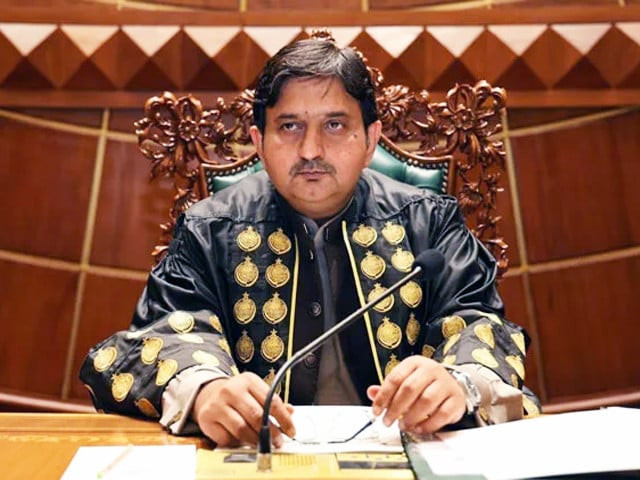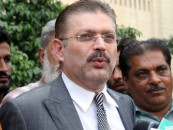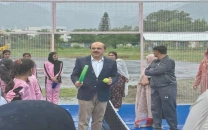PA speaker tosses disqualification bid of 26 MPAs into judicial arena
Malik Muhammad Ahmad Khan warns that entertaining such petitions would erode freedom of speech within the House

Speaker Punjab Assembly, Malik Muhammad Ahmad Khan, has declared inadmissible the applications submitted by treasury lawmakers seeking the disqualification of 26 Pakistan Tehreek-e-Insaf (PTI) MPAs suspended for alleged abusive and violent conduct. Instead, he advised the petitioners to obtain a declaration from a court or tribunal of competent jurisdiction before approaching the Speaker again.
Speaker Khan made the decision under Rule 210(3) of the Rules of Procedure of the Provincial Assembly of the Punjab, 1997. The 26 PTI lawmakers had been suspended following their disruption of Chief Minister Maryam Nawaz’s speech on 27 June.
In his detailed ruling, the Speaker stated, “Though serious legal and constitutional violations, including breach of constitutional oath, have been alleged by the applicants, these violations first need to be established in a court or tribunal of competent jurisdiction before I could decide whether a question of qualification has arisen in terms of Article 63(2) of the Constitution and refer the question to the Election Commission of Pakistan.”
Read More: Punjab speaker moves to disqualify 26 MPAs
He further added, “The people are the source of all power, and through their vote, they confer trust—not to be undone without the gravest reasons. To disqualify a representative is not merely to silence a voice—it is to disenfranchise people. For an elected House is not only a chamber of laws; it is the echo of the people's will. That voice must not be silenced.”
Speaker Khan rejected the reliance placed by applicants on precedents such as the Panama Papers case and related jurisprudence under Articles 199 and 184(3), calling such comparisons “not maintainable for constitutional and democratic reasons.”
He warned that entertaining such petitions would erode the freedom of speech within the House and effectively nullify the opposition’s role. Citing Article 19, he emphasised that robust—even abrasive—debate is protected, “subject to reasonable restrictions imposed by law,” which are outlined in assembly rules, not by threats of permanent disqualification.
He said, “Let the welfare of the people be the supreme law. The Assembly must remain a forum where dissent is voiced, not extinguished. The electorate is best served when the House disciplines disorder internally while preserving the electorate’s chosen representation.”
Highlighting the need for improved legislative performance, the Speaker noted that many members lack awareness of assembly rules, legislative procedures, and the effective use of standing committees. He stressed the importance of targeted training to ensure the Assembly upholds parliamentary supremacy and serves the public interest.
“As elected representatives, we must legislate responsibly, put an end to political victimisation, and work together to uphold the supremacy of the people’s Assembly and protect our democracy,” he said.
Calling for inter-party dialogue in the spirit of the Charter of Democracy, he said, “Political parties are the true guardians of democracy. There should be meaningful dialogue among all parties on the effective functioning of the Assembly to ensure that it serves the interests of the people and remains a forum for genuine debate and cooperation.”
Also Read: Punjab speaker agrees to dismiss references against suspended PTI MPAs
Speaker Khan strongly criticised certain constitutional provisions, particularly Articles 62, 63, and the defunct Article 58(2)(b), labelling them as relics of authoritarian regimes.
“These provisions, imposed by dictators such as General Zia-ul-Haq, have historically been weaponised to unjustly target elected politicians. We must end this vicious cycle. The Panama Case must not become another tool like Article 58(2)(b), or we risk falling into a nihilistic cycle where we repeat the same mistakes,” he said.
He warned against disqualifications based on mere allegations or technicalities, which violate the presumption of innocence and erode parliamentary legitimacy.
Citing past examples such as the Public Representative Offices Disqualification Act of 1949 and the Elective Bodies Disqualification Order (EBDO) of 1959, he said such “backdoor tools” have consistently served non-democratic elements, often with political parties complicit.
He termed the Panama case a “show trial” and said its use as a precedent undermines constitutional rights to political association and representation under Article 17.
“This destructive chain must be broken,” he said. “The very fact that the Constitution has been exploited this way means such challenging questions can be—and have been—raised.”
He concluded by vowing to uphold parliamentary rule and the principles of representative democracy, “During my tenure as Speaker, I will work to uphold parliamentary rule and the principles of representative constitutional democracy, as envisioned by our great Islamic Republic's founding fathers.”

























COMMENTS
Comments are moderated and generally will be posted if they are on-topic and not abusive.
For more information, please see our Comments FAQ